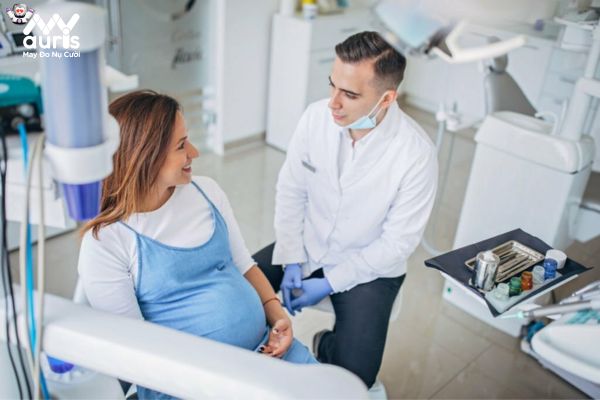Not only does nausea occur during pregnancy, many pregnant mothers also suffer from tooth decay due to many different causes. Tooth decay not only affects eating but also easily leads to many negative consequences for both mother and baby. So what should pregnant women with toothache do? In this article, we will suggest some safe ways to treat cavities at home for pregnant women, which are quite easy to do. Also refer to My Auris to know what those methods are!
What should pregnant women with toothache do?
Pregnancy can make mothers more cautious about their health. When it comes to treating oral health problems, typically pregnant women with toothaches should use some of the following methods:

Use natural ingredients to treat home treatment
- Cloves – An ideal support measure in treating toothache for pregnant mothers. You can chew some leaves or apply clove oil to the affected tooth, then just wait for the pain to subside.
- Chewing spinach is also a way to help reduce toothache for pregnant mothers.
- Chew garlic: The Allicin ingredient in garlic will be effective in killing bacteria that cause tooth decay. Besides, eating garlic also brings many other benefits to pregnant women if they know how to use it in moderate amounts.
- Gargle with water boiled with guava leaves or chew guava leaves directly to help treat toothache during the process. This is one of the most used folk tricks.
- Use warm salt water to gargle: Pregnant mothers with toothache should use warm salt water to gargle after brushing their teeth. Hold the mixture in your mouth for about 30 seconds, the salt can disinfect and temporarily reduce the pain caused by tooth decay.
These are all ways to treat tooth decay at home for pregnant mothers that are quite simple and easy to do. These ingredients can also be found quickly in the refrigerator or easily purchased at supermarkets. Hopefully these methods can help mothers accumulate more experience in their own oral care process, limiting the impact on their teeth.n health in the future.
Dental treatment
Although pregnant women with toothache must be able to apply these tips at home. mentioned above, but in reality it is only capable of providing temporary support. At the same time, there are cases where absolute effectiveness is not seen, on the other hand, it can cause pregnant mothers to be allergic to some of the above ingredients.

Therefore, pregnant mothers need advice from a specialist to ensure safety for both mother and child. In some cases, the mother may not need dental treatment until birth, but some intervention will be needed to avoid unwanted complications.
- X-ray: Method to determine the extent of damage to teeth. To ensure the safety of the fetus, when examining you, you need to clearly inform your doctor to be provided with the necessary support equipment. Protect your baby from the effects of X-ray rays.
- Teeth fillings – Indicated to be performed when pregnant mothers experience pain from cavities. The doctor also cleaned the cavity, then filled the cavity.
- Tooth scaling and cleaning of the oral cavity: Usually for pregnant mothers with toothache due to gingivitis. The doctor will scale the teeth and treat the tooth root surface to completely eliminate disease-causing bacteria.
- Using pain relievers: Using medication will require a prescription from a specialist because there are drugs that cannot be used by pregnant women, which can lead to fetal defects. Pregnant mothers may need antibiotic treatment, in case of gum or tooth infection.
Does having tooth decay affect the baby?
What to do when a pregnant woman has a toothache requires early treatment. Because if left for a long time, it will affect the health of the mother and the baby in the womb:

Increases the rate of mothers giving birth prematurely
When having a baby, the mother’s body will have changes in internal hormones hormones. Therefore, the mother is very susceptible to gingivitis, bleeding gums during pregnancy, or tooth decay. According to expert My Auris, tooth decay during pregnancy will increase the rate of premature birth and miscarriage. More seriously, pregnant mothers are susceptible to preeclampsia and babies are born with low birth weight.
Newborns are susceptible to tooth decay
During the time of development in the mother’s womb, the baby’s tooth buds are formed. By week 16 of pregnancy, your baby’s tooth enamel and dentin have developed. Therefore, at 6 or 7 months after birth, babies begin the process of teething. Therefore, when the mother has tooth decay during pregnancy, the child will also be affected, and the baby teeth that grow out will also be more susceptible to decay.
The secret to oral hygiene during pregnancy

Some notes on oral hygiene for pregnant women to reduce the risk of tooth decay and help improve your oral health:
- Brush your teeth slowly and use gentle strokes
- Should use toothpaste for sensitive teeth
- You should use a toothbrush with a small head, because during this time both the mother’s gums and gums are relatively sensitive, as well as more vulnerable
- Every time you brush your teeth it can make you feel nauseous, so try distracting your attention by listening to music or thinking about something else!
- After vomiting, be sure to rinse your mouth to avoid the proliferation of harmful bacteria in the oral cavity environment.
Tooth decay during pregnancy is also among the problems that many pregnant mothers encounter. However, if you know how to take care of your teeth scientifically and have regular check-ups, dental problems will be resolved quickly. At the same time, pregnant women with toothache must be treated completely. If you are in need of dental examination, come to My Auris to experience great serviceGreat, modern machines to support and a team of highly specialized doctors to examine!
Yen Nhi





